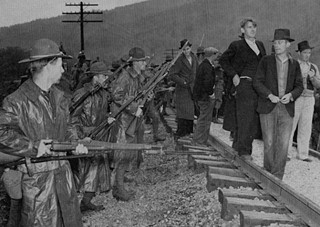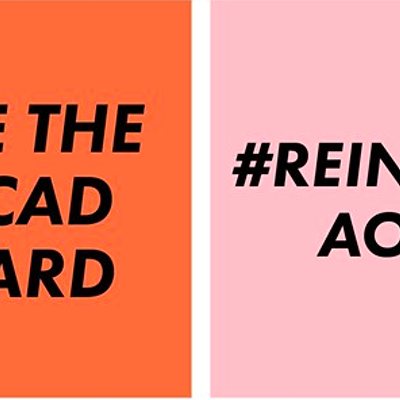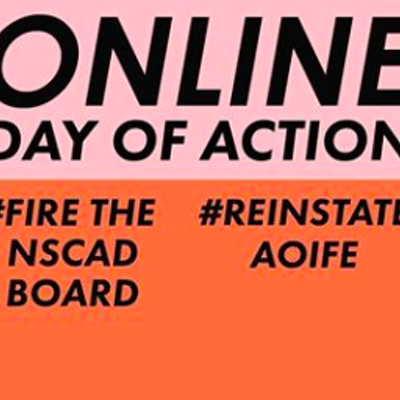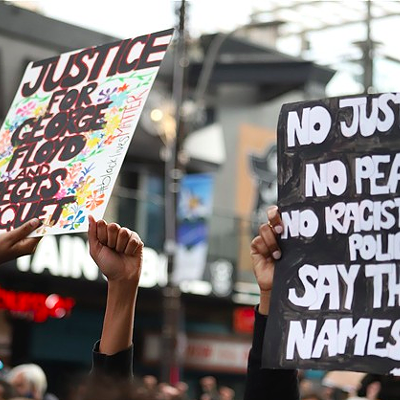I shrugged it off at the time---reporters have opinions, too, and I figured my colleague wasn't aware of my reference to the labour song, "Which side are you on?" But yesterday my American friend Michelle was musing about the song, which prompted me to follow up. If nothing else, running through the history of the song is fun; maybe it also sheds some light on our poor knowledge of labour history.
To back up, "Which side are you on?" was written by Florence Reece in 1931, in the midst of a brutal crackdown on the United Mine Workers, which were then organizing the coal mines of Kentucky:
In 1931, coal miners in Harlan County were on strike. Armed company deputies roamed the countryside, terrorizing the mining communities, looking for union leaders to beat, jail, or kill. But coal miners, brought up lean and hard in the Kentucky mountain country, knew how to fight back, and heads were bashed and bullets fired on both sides in Bloody Harlan."Which side are you on?" quickly became a staple in the union songbook. Reece, who remained a stalwart union supporter and lived into her late 80s, was recorded singing the song for the 1976 film Harlan County, USA. That documentary covers the 1973 strikes in the very same coal fields Reece wrote about 42 years earlier:It was this kind of class war -- the mine owners and their hired deputies on one side, and the independent, free-wheeling Kentucky coal-miners on the other -- that provided the climate for Florence Reece's "Which Side Are You On?" In it she captured the spirit of her times with blunt eloquence.
Mrs. Reece wrote from personal experience. Her husband, Sam, was one of the union leaders, and Sheriff J. H. Blair and his men came to her house in search of him when she was alone with her seven children. They ransacked the whole house and then kept watch outside, ready to shoot Sam down if he returned.
One day during this tense period Mrs. Reece tore a sheet from a wall calendar and wrote the words to "Which Side Are You On?" The simple form of the song made it easy to adapt for use in other strikes, and many different versions have circulated.
The tune is usually said to be an old Baptist Hymn, "Lay the Lily Low," but the British folklorist, A. L. Lloyd, points out its similarity to that of the British ballad, "Jack Munro," which uses "Lay the Lily Low" as a refrain.
I love one of the comments on that YouTube page:
I Love this song it was wrote by my Grandmother Florence Patton Reece. She was an inspiration to me growing up. My dad has the actual calendar that this song was wrote on in the 1930's. Florence & Sam Reece had 10 children and my Dad is the only living one left. I hope everyone loves this song."Which side are you on?" hit the mainstream when the Almanac Singers---the folk group comprised of Woody Guthrie, Pete Seeger, Willard Lamplell and Lee Hays---recorded it in 1941:
Of course, the all-male Almanac Singers had to tweak the words of the song a bit---the narrator becomes the son of a coal miner, not the wife. And to my ear, there's an underlying forlornness in the Almanac version as compared to Reece's original (at least as reprised in Harlan County, USA), which I hear as more combative. This is all for the better---what's great fun with this song is how it morphs through the generations depending on the audience and singer.
Pete Seeger would sing the song for the rest of his life---he's still singing it. During the folk revival of the 1960s, the song takes on an almost celebratory feel which strikes me as odd; here's Seeger's version from (I think) his 1967 Greatest Hits album:
The versatility---and continued relevance---of the song comes out wonderfully in Billy Bragg's 1987 Back to Basics, where Bragg reworks the lyrics and brings an edgy attitude to it to express anger at the union-busting Thatcher government:
In 2001, the Celtic-punk band Dropkick Murphys did a version of "Which side are you on?" for their Sing Loud, Sing Proud album. It's interesting, and none other than Shane MacGowan was a guest vocalist for the album. I don't know if MacGowan's drunken slurs are in this mix or not, but it makes me just itch for a full-blown Pogues cover:
A couple of years later, the angelically voiced Natalie Merchant recorded "Which side are you on?" for her 2003 The House Carpenter's Daughter. This version was a real surprise for me, bringing the song right back to an Appalachian spiritual, with an emotional depth that reaches right to the centre of the Earth:
This year, Ani Difranco, like Billy Bragg before her, re-writes some of the lyrics for a contemporary political purpose: to express anger at 30 years of Reaganesque economic policy and the cynicism of the Obama administration, which has sold out the progressive ideas it put forward to get elected:
But is the question, "Which side are you on?" relevant in a transit strike in Halifax? Is it fair to compare a coal miners' strike in 1931 Appalachia to middle class workers in Canada, with its universal health care and safety net protections?
My answer to that is this: We should be striving for more. Our society is doing OK economically, with productivity and total wealth increasing every year, even in these sluggish post-financial collapse years, so why is it we are looking to reduce workers' pay and benefits?
It occurs to me that no matter what the relative wealth of a society-- whether it's a poor-ish maritime province in 2012, or one of the wealthiest societies ever in existence, Britain in the 1980s, or Appalachia of the 1970s, or Appalachia of the 1930s or even societies with outright slavery---the antebellum American south, or classical Rome or whatever--- there is always some portion of the population that absolutely hates workers. Even slaves were disparaged as lazy and slothful, of living in too plush conditions for their strata in society.
The language continues on to this day: For lots of people, such and such workers are over-paid, are lazy, are a burden to society. And since it doesn't matter what society we're talking about---rich, poor, even slave societies---I just understand this view to be endemic to a certain kind of person, who naturally sides with the powerful over the weak, no matter what.
So yes, I think it's fair to ask: are you one of those people? Or do you want wealth to at least in some degree be shared by the people who actually do the productive work in society?
Which side are you on?















